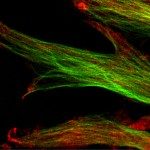Lien vers Pubmed [PMID] – 9695918
Microbiology (Reading, Engl.) 1998 Jul;144 ( Pt 7):1853-62
To investigate the metabolism of (p)ppGpp in amino-acid-producing coryneform bacteria, a PCR-based strategy using degenerate consensus oligonucleotides was applied to isolate the rel gene of Corynebacterium glutamicum ATCC 13032. The gene consists of 2283 nucleotides and encodes a protein of 760 amino acids with a molecular mass of 84.4 kDa. The amino acid sequence revealed extensive similarities to the related proteins RelA and SpoT of Escherichia coli, which are known to be involved in (p)ppGpp biosynthesis and degradation. The C. glutamicum rel gene is located downstream of the apt gene encoding an adenine phosphoribosyltransferase, and an ORF with similarities to dciAE, which represents part of a dipeptide transport system in E. coli. A C. glutamicum mutant strain carrying a defined deletion in the rel gene was constructed. This mutant failed to accumulate (p)ppGpp in response to amino acid starvation. When overexpressed in E. coli, the C. glutamicum rel gene was able to reverse growth defects caused by an overexpressed relA gene. It is proposed that the C. glutamicum rel gene encodes a bifunctional enzyme with (p)ppGpp synthetase and (p)ppGpp-degrading activities.

